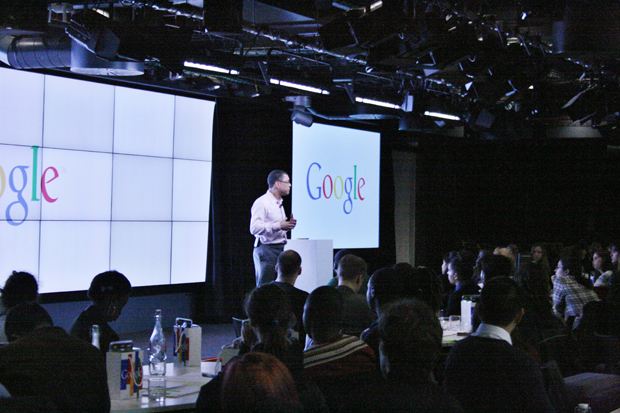Last week Google kicked off its 2013 search for the next generation of technology specialists.
To celebrate a special event was held on Wednesday 13th March at Google’s Bloomsbury office with previous participants of Google’s three unique UK-based diversity programmes – UK CodeF, Top Black Talent (TBT), and TechAbility. The room was a buzz with over 80 students and graduates who have backgrounds or an interest in computer science, technology and business and celebrated the achievements of current and past participants and encouraged them to continue to learn more about the technology industry, innovate and draw inspiration from peers and professionals. The UK-based students were also joined by mentees from Google’s CodeF Germany programme.
The three schemes are:
Top Black Talent
Google’s Top Black Talent programme (GTBT) was created to identify and support the UK’s best black students for a successful transition into the technology industry. The initiative is open to British-based students studying at any UK higher education institution and the programme consists of workshops, open days and an eight-week mentoring opportunity where Google employees are paired with students to offer them advice and guidance .
Those placed on the scheme must apply via Google’s website and fill in an application form. The best applicants are selected for interview.
Code F
Code F’ targets aspiring female computer engineers and allows them to shadow existing Google engineers in a bid to find the best talent among under-represented groups.
TechAbility
The Google TechAbility Europe Programme is a unique initiative to source, develop and recruit disabled computer scientists and business leaders of the future. This exciting programme will include the opportunity to participate in either a one-day technical or a business event at Google HQ in London, and an 8 to 12 week mentoring programme.
Each programme was designed to encourage greater numbers of black, female and disabled undergraduates, graduates and PhD students to consider careers in Technology: an industry where people from these demographics are underrepresented.
Aside from workshops on interviewing and networking skills sessions, participants also heard from Eze Vidra, Head of Google Campus, the tech hub in Shoreditch, on innovation. They also heard from Adrian Joseph, Head Of Search Advertising Solution, Northern & Central Europe at Google, Executive Sponsor of the TBT programme and Chairman of Race for Opportunity on why diversity is important to Google.
The “CodeFers”, “TBTers” and “TechAblers” also heard from alumni of the respective programmes about their experiences after the mentoring: many were now Google employees.
Speaking about the mentoring programmes, Mark Palmer-Edgecumbe, Head of Diversity & Inclusion EMEA at Google, said: “We strongly believe that talent, determination and excellence is not defined along gender, race or disability lines and want to encourage the brightest, most engaged and enthusiastic computer scientists to consider a career in tech and maybe one day even at Google.”
Google selected around 100 people from hundreds of attendees at special diversity insight events to go on to get a mentor. At these mentoring sessions participants received one-on-one guidance and support from Google engineers, technicians and business function Googlers on, amongst other things, improving technical skills, career planning, developing personal and professional skills, learning about Google products and services and technical project coaching.
For more information or to apply for any of these schemes visit their website: CodeF, TBT and TechAbility.














